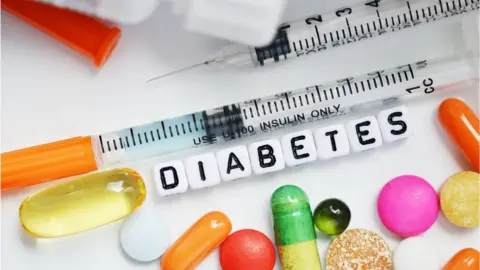Why hot weather makes managing diabetes harder
 Beth McDaniel and Ellen Watson
Beth McDaniel and Ellen WatsonAs the UK experiences record temperatures, for those with diabetes, the advice is to be even more careful.
Spending long periods not being very active in the sun can send blood-sugar levels higher than usual.
But the level can also drop to low - hypoglycaemia - as injected insulin is absorbed more quickly in warm weather.
Charity Diabetes UK advises checking levels more regularly and being prepared to adjust doses and diet, with extra sugary snacks on hand.
It also suggests:
- Storing insulin somewhere cool, such as a cool bag or the fridge
- Keeping blood-sugar test strips and meters out of direct sunlight - but not in the fridge
- Staying hydrated and applying lots of suncream
Beth McDaniel, diagnosed with type 1 diabetes in 2019, makes educational content online with her best friend, Ellen, who has had diabetes since the age of six.
"Ellen was telling me, 'Oh, when it comes to summertime, diabetes really affects us,' she tells BBC News, "and I was shocked as I love the sun and going on holidays.
"There's so many precautions you need to take - for example, your insulin can go cloudy if it's in the heat or full sun exposure and means it's really dangerous to put in your body.
"When Ellen and I went to Spain, we got these little cooler bags to take to the beach so we didn't have to worry about our insulin going cloudy."
But it has been "hard" for the 22-year-old, from County Down, to manage her diabetes in the UK heatwave.
 Beth McDaniel
Beth McDaniel"When you go on holiday, you're prepared - you know it's going to be hot," she says.
"But when you're at home, it can be a bit daunting - I've got through it and made sure to stay really hydrated and keep my diabetes equipment at normal room temperature.
"At home, my mum literally colour co-ordinates the chocolate bars and we have a million cans of coke for hypos.
"People are coming round and they're like, 'Can I have a Coke?' and we say, 'No, they're for the diabetics.'"
What is diabetes?
 Getty Images
Getty ImagesThere are 2 main types of diabetes, which causes blood sugar to be too high:
- type 1 - the body cannot make insulin
- type 2 - the body makes too little or cannot use it efficiently
In the UK, about 90% of adults with diabetes have type 2.
